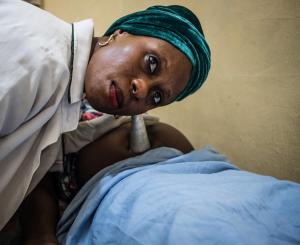Tackling high maternal deaths in Mauritania
Nouakchott, 8 March 2020 – A cloud of dust lifted slowly off the forecourt of Sebkha health centre where an ambulance had just rushed a patient. Inside visitors milled about as nurses paced up and down the corridors. When one of the nurses passed by, an elderly woman waiting outside the delivery room sat up and asked how her daughter was doing. “Don’t worry madam,” came the reply, “your daughter will give birth safely. She’s in good hands.”
Maternal mortality in Mauritania is among the highest in Africa, with 766 deaths for every 100,000 live births. The rate has mostly plateaued over the past two decades. The capital Nouakchott accounts for nearly half of those deaths. A huge number of high-risk pregnancies, low quality prenatal health care, poor access to emergency assistance as well as cultural and socio-economic factors are among the reasons for the high maternal mortality.
Delays, delays, delays
The elderly woman outside the delivery room recounted that it took two rickshaw rides over several kilometres to bring her daughter to give birth at Sebkha for she had heard word of good care at the health centre. “In my family, every woman gives birth at home. But with many deaths being reported we now prefer to go to a hospital,” she said.
Haemorrhage, hypertension disease during pregnancy and infections such as HIV and malaria in Sub-Saharan Africa are some of the major causes of maternal mortality. However, delay in deciding to seek professional care, delay in reaching a medical centre, and once there, delay in getting the needed care also contribute to maternal deaths.
Social, cultural, education, economic and geographic factors can cause these delays. The state of health systems, which are largely weak in Africa, is also a key contributor to high maternal deaths.
Across the world, for every woman who dies of pregnancy-related complications, another 30–50 suffer injury, infection (with consequences such as infertility) or disease that affects the quality of life, and in many cases lead to premature death. Of the estimated 295 000 maternal deaths that occurred globally in 2017, 202 000 (68.7%) occurred in Africa, with 66% in Sub-Saharan Africa.
Home delivery
Without a skilled birth attendant or in case of complications, the safety of childbirth at home can be compromised. Chances of infection also rise if hygiene conditions are low. Roughaya, a midwife at Sebkha health centre who preferred to be identified by only one name, explained that cutting the umbilical cord, for instance, during most home deliveries consists of a tie-up with a locally woven string and a snip using a razor bought from the neighbourhood kiosk. “We are doing our best, but there are still many children who die right after birth,” said Roughaya.
Two years ago, Mauritania’s Ministry of Health launched a programme to turn the tide against high maternal deaths. Financed by the India-UN Development Partnership Fund, the US$ 400 000-plan is piloted by the World Health Organization and focuses on strengthening programme management and coordination, staffing the 11 selected health centres with qualified personnel available round the clock, and equipping the clinics with sufficient medicines and supplies.
Since the programme started, 11 data managers and 89 midwives have been trained, with 17 other midwives trained on supervision, including supervising the maternal and newborn health programme. All the selected health centres have been fully stocked with equipment and medicines. Service management, patient handling and hygiene levels have drastically improved in the health centres under the pilot programme.
“Previously we had a critical lack of equipment. The quality of care has now greatly improved,” said midwife Roughaya. “We have seen a 50% rise in the number of people seeking treatment here largely thanks to word of mouth.”



